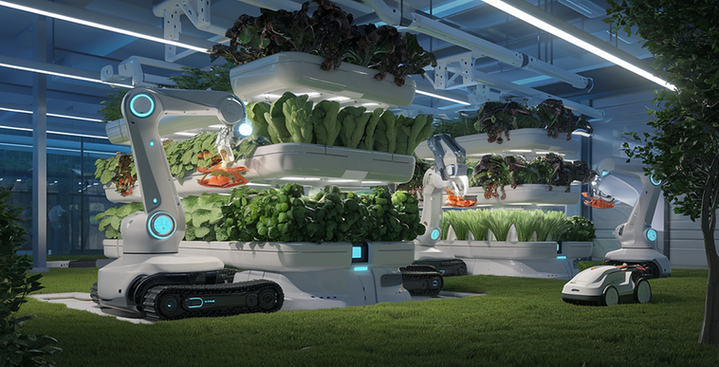SMART FARMS AND 3RD GREEN REVOLUTION
Smart farming, also known as smart agriculture, is the adoption of advanced technologies and data-driven farm operations to optimize and improve sustainability in agricultural production. Technologies used for smart farming include artifical intelligence (AI), automation and the Internet of Things (IoT).
Through strategic partnerships, SACOMA Global Foods Innovation , building a sustainable farming ecosystem that benefits both farmers and consumers. Driving global smart farming and sustainable agriculture innovation, .
We are collaborating in self-sufficient systems, emerging industries renewable energy to become a leader in smart agricultural technology Through smart farming technology to revolutionize crop cultivation and management practices while driving the digital transformation of agriculture worldwide.
‘Companion (Pet) Plants’, Smart Farms, 3rd Green Revolution and a decline in the farming population
Food tech industry is now serving a growing urban farming population of Veg eaters who put sustainability by indoor gardens of ‘companion pet plants.
Why is there demand for such items ‘COMPANION (PET) PLANTS’?

A family admiring their Plant from smart indoor garden.
Example is the Daedong's AI Indoor Garden kit featuring smart farming technology. Daedong’s AI garden kit which can grow more than 40 varieties of leafy vegetables, herbs, flowers, and fruits, as well as other functional natural plantsSmart farming and IoT-driven agriculture are paving the way for what can be called a Third Green Revolution. -AI Indoor Garden Kits that promotes urban gardening and indoor farming- Uses “smart farming” technology powered by cutting-edge AI to spread the joy and value of farming with “easy farming” solutions engineered for urban environments- Once a seed capsule is placed in the growing station, the device automatically controls everything from the growing method to growing environment and also monitors the growth rate Daedong sees the urban farming population and urban agricultural market growing due to the growth of the food tech industry, the decline in the farming population, climate change, natural disasters, and the increase in horticulturists who enjoy growing “companion (pet) plants.”

There are clues in the product descriptions, with phrases such as "healthy eating", "no added toxins", "organic", "pesticide-free", and "sustainable". These products may therefore appeal to consumers who have lost trust in the conventional farming and retail systems.


The AI Plant Box (a CES honoree) is a home-farming kitchen appliance with artificial intelligence, automated environmental control, plant monitoring via an integrated camera, and energy-efficient engineering.Designed to integrate with other home appliances and kitchen decor, it features easy-to-use cultivation trays suitable for all ages. It enables anyone to cultivate crops they need at homeTwo of the three products come from South Korea.
One of them is Daedong's AI Indoor Garden Kit, and Daedong predicts that the urban farming population and urban agricultural market will grow. This is, in fact, part of government policy in South Korea, with the Ministry of Agriculture, Food and Rural Affairs planning to grow the domestic urban farming population to three million by 2027, it has already increased by nearly 50% from about 1.31 million in 2015 to about 1.96 million in 2022.Indoor gardens are an interesting diversification for Daedong, which is the No 1 agricultural machinery company in Korea, and the manufacturer of Kioti brand tractors for overseas markets.
THESE TECHNOLOGIES JUST SHOW HOW OUR FUTURE FOOD PRODUCTION IS LIKELY TO BE DISRUPTED BY FOOD TECH
Following the plant breeding and genetics revolutions, the Third Green Revolution is taking over agriculture. That revolution draws upon the combined application of data-driven analytics technologies, such as precision farming equipment, IoT, big data analytics, robotics, etc.In the future, this smart farming revolution depicts, pesticide and fertilizer use will drop while overall efficiency will rise. IoT technologies will enable better food traceability, which in turn will lead to increased food safety. It will also be beneficial for the environment, through, for example, more efficient use of water, or optimization of treatments and inputs.
Daedong sees the urban farming population and urban agricultural market growing thanks to the growth of the food tech industry, the decline in the farming population, climate change, natural disasters, and the increase in horticulturists who enjoy growing “companion (pet) plants.” To that end, the Ministry of Agriculture, Food and Rural Affairs plans to grow the domestic urban farming population, which increased by nearly 50% from approximately 1.31 million in 2015 to approximately 1.96 million in 2022, to 3 million by 2027.
Daedong expects that even novice farmers in urban areas will be able to easily cultivate crops in the city and indoors rather than on a farm, spreading the joy and value of agriculture.
Therefore, smart farming has a real potential to deliver a more productive and sustainable form of agricultural production, based on a more precise and resource-efficient approach.
New farms will finally realize the eternal dream of mankind. It’ll feed our population, which may explode to 9.8 billion by 2050.The future of agriculture will minimize environmental impact while ensuring a stable food supply for everyone
Key Benefits of Smart Farming : Speeding up data collection and processing, increasing accuracy and precision level, enhancing production efficiency, reducing production costs, lowering the need for manual labour, increased crop yield, minimizing driver stress, simplifying risk forecasting, streamlining task recording and reporting, boosting sustainability.
“Through smart farming, we can better adapt to the uncertainties brought by climate change, mitigate environmental impacts and promote resilience in agricultural production.” — The International Organization for Standardization
Across every aspect of crop production, smart farms facilitate precise irrigation, customised nutrient management and automated climate control

What is Smart Farming?
Smart farming is a system that maximizes agricultural efficiency by utilizing IoT, AI, big data analytics, and cloud technologies. IoT sensors collect data on soil, temperature, and humidity, which AI analyzes to optimize the crop growth environment. Additionally, automation technologies and drones are employed to perform agricultural tasks efficiently, reducing operational costs and enhancing productivity.














